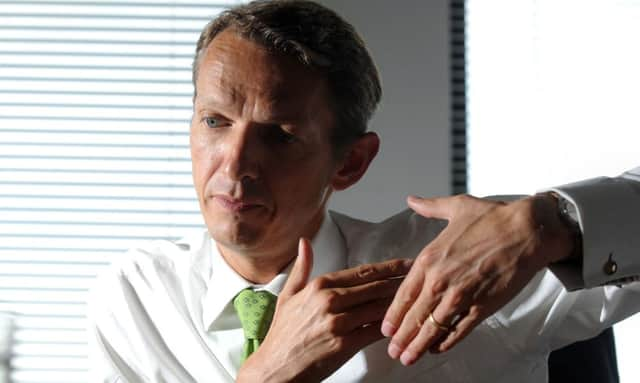Bank’s chief economist ‘leading race to take charge of watchdog’


Mr Haldane, who is from Guiseley, near Leeds, has reportedly emerged as the frontrunner to head the Financial Conduct Authority (FCA)
The Sunday Times says Mr Haldane is tipped to become the chief executive at the City watchdog when the current CEO, Martin Wheatley, leaves next year.
Advertisement
Hide AdAdvertisement
Hide AdAn un-named senior bank executive told the paper: “Haldane is definitely in the frame and is considered to be young and keen. His one problem is probably a lack of experience in retail banking.”
An FCA spokesman declined to comment on the report. Mr Haldane has established a reputation as an independent thinker who supports tough regulation. He is seen as a rising star within the central bank and was described in a profile as “the coming man of British banking”.
He made headlines in 2012 when he said the Occupy protest movement was right to criticise the global financial system.
In 2014, TIME magazine voted him one of the 100 most influential people in the world.
Advertisement
Hide AdAdvertisement
Hide AdHe has written extensively on domestic and international monetary and financial policy issues, and he is co-founder of ‘Pro Bono Economics’, a charity which brokers economists into charitable projects
Last year, Mr Haldane told a Yorkshire audience that the taxpayer rescue of the financial sector was “unjust, wrong and intolerable” and society will not stand for it again.
Speaking in Sheffield in February 2014. Mr Haldane - who was the bank’s executive director for financial stability at the time - said the bailout - £1.162 trillion at its peak - was necessary if not essential to prevent a social and economic fallout on the scale of the Great Depression.
But he added: “Was that fair? Absolutely it was not.
“In the grand scheme of things, what we saw was the upside being harvested by the financial sector and the downside being taken by wider society. That is unjust and wrong and intolerable and the reform agenda is removing us from that hook.
Advertisement
Hide AdAdvertisement
Hide Ad“We cannot afford, metaphorically and literally, to have this happen again. Society won’t tolerate a repeat performance of what we have seen.”
Mr Haldane, who was speaking at Sheffield University, said regulators were working to prevent future financial crises by making it easier for new banks to enter the market and to allow larger institutions to fail without jeopardising the entire banking system.
He said: “You cannot have capitalism without failure. That’s like politics without elections. It just can’t work. Capitalism without failure is communism.”
The new chief executive of the FCA will have the demanding job of policing Britain’s banking sector, which has been hit by a wave of scandals in recent years. Altogether, the FCA regulates more than 50,000 businesses.
Advertisement
Hide AdAdvertisement
Hide AdFor many of these firms, the FCA also considers whether they meet the standards that reduce the potential harm to the industry and consumers if they fail.
The FCA is funded entirely by the firms that it regulates, through charging them fees to carry out their financial activities.
How much they pay is determined by what type of business they are and what activities they carry out. It is accountable to the Treasury and Parliament. However, it is an independent body that does not receive any funding from the Government.